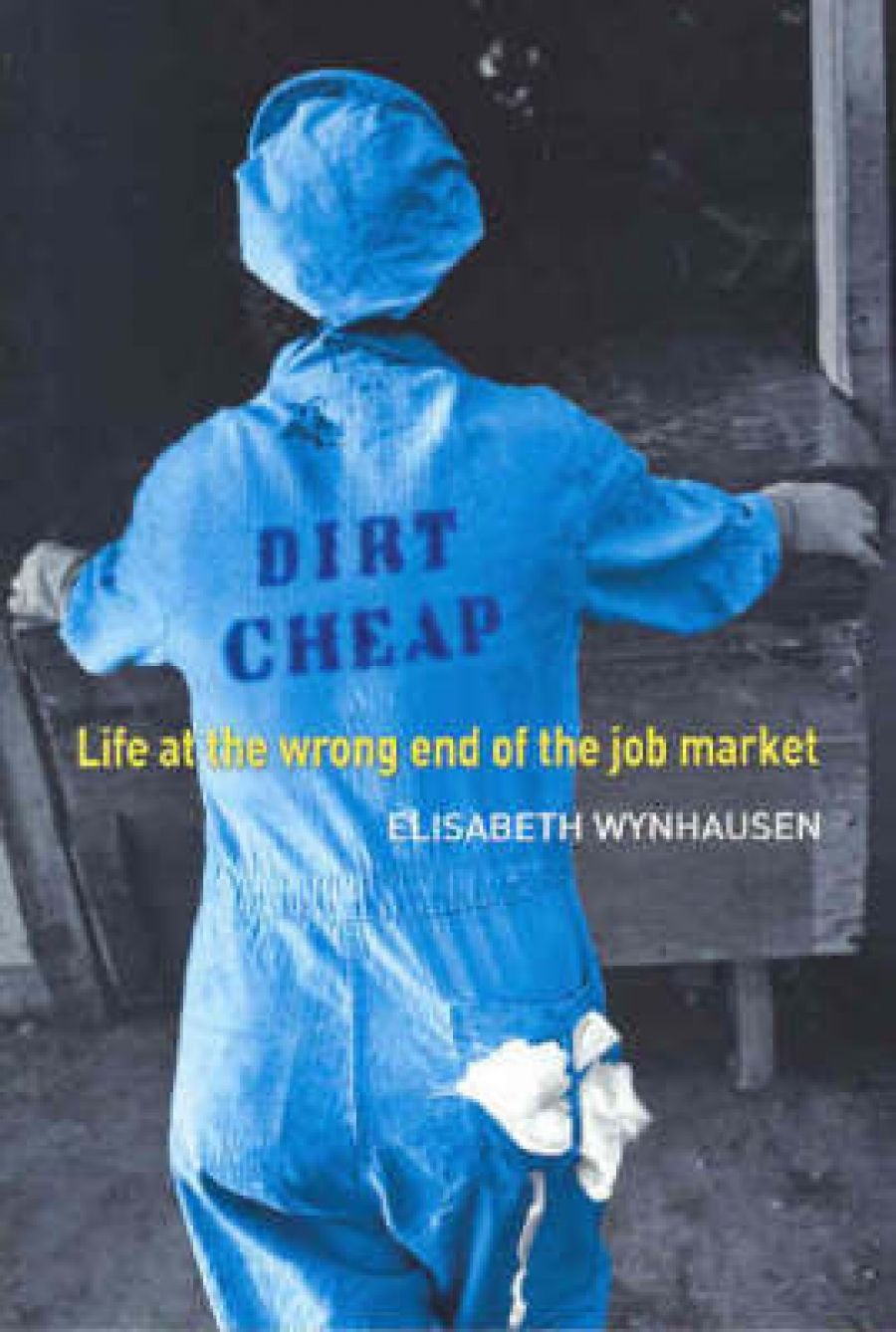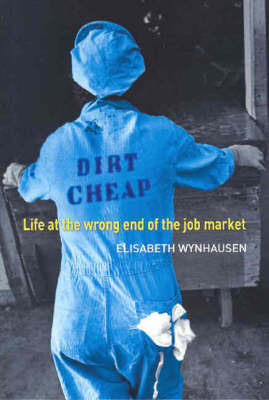
- Free Article: No
- Contents Category: Society
- Review Article: Yes
- Article Title: Working poor
- Online Only: No
- Custom Highlight Text:
In this important book, Elisabeth Wynhausen seeks to ‘animate the experience of a class of people who had remained invisible even as their numbers swelled’. That class is the ‘working poor’, the people who clean, cook, wait tables and deal with everyone else’s garbage. They are the so-called ‘losers’ from economic change: the men and especially the women who do the jobs the winners don’t want to do any more, like clean their own toilets.
- Book 1 Title: Dirt Cheap
- Book 1 Subtitle: Life at the wrong end of the job market
- Book 1 Biblio: Macmillan, $30 pb, 255 pp
- Book 1 Cover Small (400 x 600):

- Book 1 Cover (800 x 1200):

Wynhausen is refreshingly blunt about her subject. While Dirt Cheap draws its method from Barbara Ehrenreich’s Nickel and Dimed: On (Not) Getting by in America (2002), I think it matches and even betters Ehrenreich’s account. Wynhausen has the same degree of empathy, and conveys, just as compellingly, the intense busyness of low-paid workers’ lives. She argues with passion and anger but without shouting or showing off.
There is also a pleasing modesty about her story. Of course, too much of the debate about work and social policy in Australia is conducted from a great height. But there is a danger in getting closer. The last thing low-income Australians need is visits by poorly disguised bourgeois slummers, especially if they’re full of well-meaning, moralising bullshit about social capital and behavioural change. Wynhausen avoids such patronisation. Instead, she writes about her own incapacities, especially her failure to manage what several million Australians must do without much of a safety net: keep themselves and their families on less than five hundred dollars a week. She also shows people the respect of honesty. She does not present them as heroes, because they’re not. Some seem complete bastards, but Wynhausen knows this doesn’t justify treating them as second-class citizens. Wynhausen has felt, and ably captured, the indignities of the low-wage scramble, and the way insecurity and anxiety rub away at confidence and self-esteem.
Most of all, she has listened to people and changed her conclusions as a result. She began expecting to find everybody in the low-wage world experiencing a hard struggle. But the issue is more complicated. People on a low wage are able to manage as long as they work full-time, or live with a second income earner. In those situations, they are often achieving at least some of their aspirations, and building some buffers against future insecurities. The real problems, which are masterfully evoked in the chapter describing department stores, stem from insufficient work, especially the casualised and part-time jobs that are becoming more and more frequent. It is very hard for people in full-time work or secure work fully to appreciate life as a casual: intermittent hours, called in on a whim, working two or three different jobs in any given week, no sick or holiday leave, few entitlements, juggling wages against welfare benefits on endless forms, inadequately trained, easily dismissed and frequently ignored. You would think that a situation so unpleasant would be something we had been trying to leave in the past, but it’s what some powerful people in this country want to make part of the future. Not their future, of course, nor their children’s future – just other people’s.
It seems strange to have to say this again, but insecurity and anxiety aren’t good for people. They’re not even good for business; as Wynhausen shows, the outcomes of casualised and careless employment include careless performance and decreasing loyalty among employees to their employers. We can hear any number of fantasies about the benefits of low wages and ‘flexibility’, and about the absence of ‘real poverty’ in this country: Wynhausen’s book tells the truth about what all those fantasies are doing to real people. If she had done nothing else, that is victory enough.
Of course, it is becoming harder to make a difference or to have an impact if you’re writing about poverty or class in Australia. One of the people who featured in my book on poverty, The Lowest Rung (2003), said this: ‘people are blaming the poor again and people don’t know, they really don’t know what’s going on here. They’ve got no idea. How do you get people to see?’ Wynhausen’s book is important because it will help some people to see by creating the material for imaginative connection and by bearing witness to what is going wrong. It also insists that the people about whom she writes have the capacity to understand their situation and to suggest ways of improving it.
I’ve always wanted to declare a moratorium on debates about welfare and work. Just for a short time, only some people would be able to speak. Not people on theoretical hobby-horses or chattering conservatives and politicians so enmeshed in their own spin they can’t tell real from false. Instead, the people who actually work in the low-wage, casualised world; those who depend upon welfare benefits to live; those who work one hour per fortnight and thus are not counted among the ‘unemployed’; those holding down three jobs to keep their house; and those who know something about hard work and insecurity, and how you might achieve a form of flexibility that works for employees as well as employers. It probably won’t happen. If it doesn’t, a book such as Dirt Cheap is the best alternative, and something everyone should read.


Comments powered by CComment